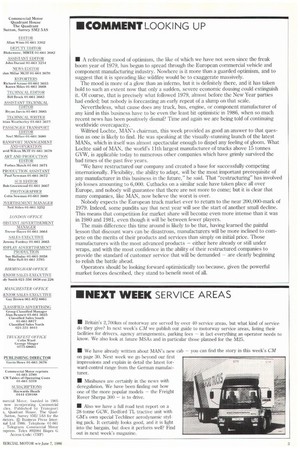• A refreshing mood of optimism, the like of which
Page 3

If you've noticed an error in this article please click here to report it so we can fix it.
we have not seen since the freak boom year of 1979, has begun to spread through the European commercial vehicle and component manufacturing industry. Nowhere is it more than a guarded optimism, and to suggest that it is spreading like wildfire would be to exaggerate massively.
The mood is more of a glow than an inferno, but it is definitely there, and it has taken hold to such an extent now that only a sudden, severe economic dousing could extinguish it. Of course, that is precisely what followed 1979, almost before the New Year parties had ended; but nobody is forecasting an early repeat of a slump on that scale.
Nevertheless, what cause does any truck, bus, engine, or component manufacturer of any kind in this business have to be even the least bit optimistic in 1986, when so much recent news has been positively dismal? Time and again we are being told of continuing worldwide overcapacity, Wilfried Lochte, MAN's chairman, this week provided as good an answer to that question as one is likely to find. He was speaking at the visually-stunning launch of the latest MANs, which in itself was almost spectacular enough to dispel any feeling of gloom. What Lochte said of MAN, the world's 11th largest manufacturer of trucks above 15 tonnes GVW, is applicable today to numerous other companies which have grimly survived the bad times of the past five years.
"We have restructured our company and created a base for successfully competing internationally. Flexibility, the ability to adapt, will be the most important prerequisite of any manufacturer in this business in the future," he said. That "restructuring" has involved job losses amounting to 6,000. Cutbacks on a similar scale have taken place all over Europe, and nobody will guarantee that there are not more to come; but it is clear that many companies, like MAN, now believe the worst is over.
Nobody expects the European truck market ever to return to the near 200,000-mark of 1979. Indeed, some pundits say that next year will see the start of another small decline_ This means that competition for market share will become even more intense than it was in 1980 and 1981, even though it will be between fewer players.
The main difference this time around is likely to be that, having learned the painful lesson that discount wars can be disastrous, manufacturers will be more inclined to compete on the merits of their products and services than simply on initial price. Those manufacturers with the most advanced products — either here already or still under wraps, and with the most confidence in the ability of their restructured companies to provide the standard of customer service that will be demanded — are clearly beginning to relish the battle ahead.
Operators should be looking forward optimistically too because, given the powerful market forces described, they stand to benefit most of all.




























































